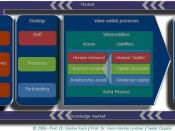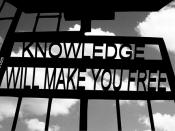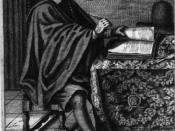May one rightly understand knowledge of something, x, as being produced by our having "first-hand" perceptual experience of x? Contrast this common belief with Descartes' view of how knowledge is created. Which is more plausible?
A common belief of knowledge is understood as having "first-hand" perceptual experience of x for one to rightly understand knowledge of something x. My belief is the same as Descartes' belief. Descartes rejects, as though false, all types of knowledge by which he was ever deceived. His view of how knowledge is created is based on authority is set aside because even experts are sometimes wrong. Knowledge from sensory experience is declared untrustworthy because people sometimes mistake one thing for another, as with mirages. Knowledge based on reasoning is rejected as unreliable because one often makes mistakes as, for example, when adding. Finally, knowledge may be illusory because it comes from dreams or insanity or from a demon able to deceive men by making them think that they are experiencing the real world when they are not.
Descartes' view of how knowledge is created is more plausible, to me obviously, as I agree with it, for the reasoning given.


